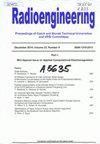Spatial Localization of Electromagnetic Radiation Sources by Cascade Neural Network Model with Noise Reduction
IF 0.7
4区 工程技术
Q4 ENGINEERING, ELECTRICAL & ELECTRONIC
引用次数: 0
Abstract
. In this paper, the Direction of Arrival - DoA estimation for two mobile sources was performed by using the Single Multilayer Perceptron (MLP) neural network model (SMLP-DoA) and the Cascade MLP model(CMLP). The latter model consists of two neural networks connected in a cascade where the outputs of the first MLP that rejects noise represent the inputs to the second network in a cascade. The outputs of the neural network models determine the direction of arrival of the incoming signals. Two cases were considered, in the first case the neural networks were trained on the samples that were without noise, and in the second with samples containing noise. Both considered neural network models were tested with noisy samples. The results of these two neural models are compared to the results achieved by the RootMUSIC algorithm. The presented results show that the proposed CMLP model has a higher accuracy in determining the angular positions of sources compared to the classical SMLP-DoA model and the RootMUSIC algorithm. Moreover, the CMLP model executes significantly faster compared to the model based on the RootMUSIC algorithm.基于降噪级联神经网络模型的电磁辐射源空间定位
. 本文采用单层感知器(MLP)神经网络模型(SMLP-DoA)和级联MLP模型(CMLP)对两个移动信号源进行了到达方向DoA估计。后一种模型由两个以级联方式连接的神经网络组成,其中第一个抑制噪声的MLP的输出代表级联中第二个网络的输入。神经网络模型的输出决定了输入信号的到达方向。考虑了两种情况,在第一种情况下,神经网络在没有噪声的样本上训练,在第二种情况下,神经网络在含有噪声的样本上训练。两种考虑的神经网络模型都用带噪声的样本进行了测试。将这两种神经模型的结果与RootMUSIC算法的结果进行了比较。结果表明,与传统的SMLP-DoA模型和RootMUSIC算法相比,CMLP模型在确定源的角度位置方面具有更高的精度。此外,CMLP模型的执行速度明显快于基于RootMUSIC算法的模型。
本文章由计算机程序翻译,如有差异,请以英文原文为准。
求助全文
约1分钟内获得全文
求助全文
来源期刊

Radioengineering
工程技术-工程:电子与电气
CiteScore
2.00
自引率
9.10%
发文量
0
审稿时长
5.7 months
期刊介绍:
Since 1992, the Radioengineering Journal has been publishing original scientific and engineering papers from the area of wireless communication and application of wireless technologies. The submitted papers are expected to deal with electromagnetics (antennas, propagation, microwaves), signals, circuits, optics and related fields.
Each issue of the Radioengineering Journal is started by a feature article. Feature articles are organized by members of the Editorial Board to present the latest development in the selected areas of radio engineering.
The Radioengineering Journal makes a maximum effort to publish submitted papers as quickly as possible. The first round of reviews should be completed within two months. Then, authors are expected to improve their manuscript within one month. If substantial changes are recommended and further reviews are requested by the reviewers, the publication time is prolonged.
 求助内容:
求助内容: 应助结果提醒方式:
应助结果提醒方式:


